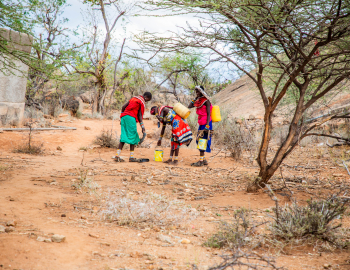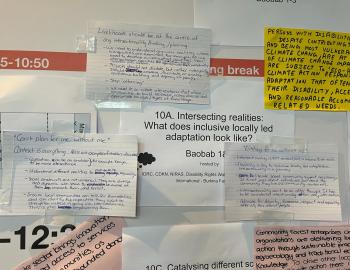Building water resilience in Kenya’s arid and semi-arid land areas
Building water resilience in Kenya’s arid and semi-arid land areas
Context
Arid and semi-arid counties in Kenya have increasingly faced challenges due to climate change, including greater water scarcity across these regions. In response, the Adaptation Consortium (ADA) conceptualised a devolved climate finance model, the County Climate Change Fund (CCCF) mechanism that facilitates the flow of climate finance to the local level to finance locally-led public good climate investments. The CCCF was piloted in five arid and semi-arid counties (Wajir, Garissa, Isiolo, Kitui and Makueni) between 2012 and 2018, and scaled out to the rest of the country from 2019 onwards.
Between 2012 and 2018, 114 public good adaptation investments were established across the five counties, financed through the CCCF, 95 of which were water projects including boreholes, sand dams, water weirs, rock catchments, earth dams and water pans. The projects improved the livelihoods of the dependent communities, and their sustainability/functionality remains a matter of interest to the beneficiaries and partners.
In 2019, ADA conducted a functionality and governance study to assess 62 of the 95 water projects. This study involved a comprehensive examination of the key issues affecting the sustainability/functionality of these investments. In 2023, CDKN commissioned a longitudinal functionality and governance study to assess the same investments as the 2019 study.
Project objectives
The primary objective of the longitudinal study was to identify and assess the factors (challenges and successes) that affect the functionality and governance of the public good investments. Specific objectives included investigating technical issues, assessing community engagement, examining governance challenges, and analysing factors influencing projects' sustainability.
Project activities
A mixed-methods approach was employed, combining focus group discussions, key informant interviews with videography and photography, and observation checklists for technical assessments. Field data was gathered that captured the perspectives of communities, site committees and relevant stakeholders.
A National Learning Event, "Learning from the Experience of Climate Resilient Public Good Investments" on 17th April 2024, distilled insights from the longitudinal study and fostered a collective understanding of policy and good practices for investing in locally-led public good climate investments.
Project outputs
The findings have been synthesised into a number of knowledge products, including:
- Policy brief: Ten years on: Enabling the success of locally-led water investments in Kenya’s arid and semi-arid counties
- Six videos, one for each county: Garissa, Isiolo, Kitui, Makueni and Wajir, plus one overarching
- Synthesis report: A longitudinal study on locally-led water infrastructure investments in select arid and semi-arid counties in Kenya
- Five technical briefs, one for each county: Garissa, Isiolo, Kitui, Makueni and Wajir
Contact
For more information, contact:
Robi Redda, CDKN Kenya - Country Engagement Lead via email: robi@southsouthnorth.org or LinkedIn
Esperanza Karaho, CDKN Kenya Programme Manager via email: esperanza@southsouthnorth.org or LinkedIn


